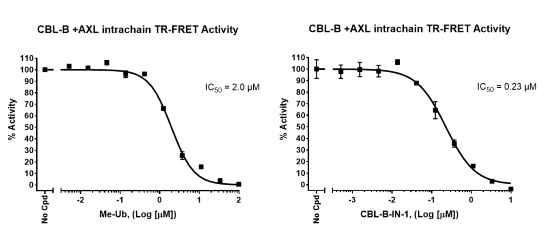CBL-B-Driven AXL Ubiquitination Intrachain TR-FRET Assay Kit
The CBL-B-driven AXL ubiquitination intrachain TR-FRET Assay Kit utilizes a Europium cryptate-labeled Ubiquitin Donor and a Cy5-labeled Ubiquitin Acceptor to complete the TR-FRET pairing. Since both the TR-FRET donor and acceptor are incorporated into poly-ubiquitin chains, this assay does not detect mono-ubiquitination. The FRET-based format requires no time-consuming washing steps, making it especially suitable for HTS applications as well as real-time analyses of polyubiquitination.

Figure 1: CBL-B-driven AXL ubiquitination intrachain TR-FRET Assay Kit schematic.
Need us to run inhibitor screens or profile your compounds against CBL-B-Driven AXL Ubiquitination? Check out our Ubiquitination Screening Services.
- Fluorescent microplate reader capable of measuring Time Resolved Fluorescence Resonance Energy Transfer (TR-FRET)
- Adjustable micropipettor and sterile tips
- Rotating or rocker platform
| Catalog # | Name | Amount | Storage |
| 80301 | UBE1 (UBA1), FLAG-Tag* | 40 µg | -80°C |
| 80314 | UbcH5b, His-Tag * | 60 µg | -80°C |
| 80415 | CBL-B, GST-Tag* | 8 µg | -80°C |
| 100174 | AXL, FLAG-Tag* | 10 µg | -80°C |
| 78307 | TRF Ubiquitin Mix (200x) | 40 µl | -80°C |
| ATP (4 mM) | 2 x 1 ml | -80°C | |
| U2 Assay Buffer | 2 x 10 ml | -80°C | |
| 79969 | White, nonbinding, low volume 384-well microtiter plate | Room Temp |
*The initial concentration of enzyme is lot-specific and will be indicated on the tube containing the protein.
The Ubiquitin Mix is sourced from South Bay Bio LLC.
Covalent conjugation to ubiquitin (Ub) regulates protein stability, function, and localization. Ubiquitination is the concerted action of three enzymes: a Ub-activating enzyme E1, a Ub-conjugating enzyme E2, and a Ub ligase E3. The specificity and efficiency of ubiquitination are largely determined by the E3 enzyme, which directs the last step of the Ub-conjugating cascade by binding to both an E2∼Ub conjugate and a substrate protein.
Casitas B-lineage lymphoma proto-oncogene-b (CBL-B) is the RING-type E3 ligase that functions as a negative regulator of T cell activation. It contains an N-terminal tyrosine kinase binding domain, a SRC homology domain, and the RING domain responsible for its catalytic function. Additionally, CBL-B contains proline-rich regions mediating the association with phosphorylated proteins, and a dimerization domain. CBL-B interacts with a large number of target proteins implicated in the control of cell proliferation, differentiation, and cell morphology. The ubiquitin ligase activity of CBL-B is up-regulated by the phosphorylation of Tyrosine 363, which opens CBL-B from its auto-inhibitory conformation, allowing binding of E2 and substrates. Kinases that phosphorylate CBL-B, such as AXL, Tyro3, and SRC, also serve as substrates for ubiquitination.


